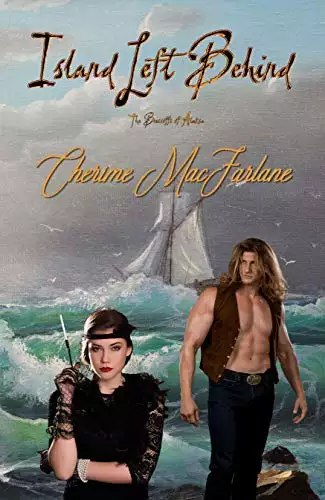For the third time in a week, the carriage on the sawmill needed another repair. The damn thing was old and infirm. Her father loved it; it hated her. Marina sighed. Far off the beaten track now, getting things to the island taxed her ability to manage the mill. It no longer did any good to put the flags out. Who knew when a ship would see it?
Before Juneau became the main destination, back when Sitka was the capital of the territory, traffic ran steadily past the island. When Juneau became the focus of government, things changed and not for the better to Marina’s mind. Bressoff Island had been left behind.
The only ships which regularly stopped in the harbor now were those belonging to Aunt Leontine. They had good timber, and it never failed to bring a good price when put on the market. Poppa and Uncle Dmitri knew how to harvest timber so as not to denude the forest.
Many things were changing. Few families remained in the village—less than half. Fur hunting took the men farther afield and their families followed. Which had done them little good when the flu struck. A few women and children had trickled back with tales of the horror.
Perhaps, in some ways, no longer being a viable destination and overlooked by the outside world kept them from the infection. A good thing, it still did nothing to cure the other problem—lack of parts. Perhaps they should invest in a new mill. Or should they? She had enough young men to cut trees and skid them down to the mill. If they continued to cut trees and mill lumber.
Marina sighed. She must discuss it with Camille. Something she didn’t look forward to. If she concentrated on work, she could ignore the misery. Her Poppa, brother, and Uncle Dmitri were gone, and she must carry on. Anger at the war, and the men who started it, caused her to clench her fist.
Like fools filled with too much vodka, Alexis and Dmitri couldn’t be off to get involved fast enough. Neither fool enough to go to Russia, they went to France. Dmitri still lived. Her older brother, Alexis Basil who they called Basil to not confuse him with their father, didn’t survive. Now Mamma and Camille languished, widows both. Although the Count hadn’t gone to war, the conflict was indirectly responsible for his death. Had Dmitri stayed home, his poppa wouldn’t have gone looking for him. Her poppa wouldn’t have accompanied the Count, and they would be here with their families.
Yes, both men had slowed down. Still, for their ages, they were hale enough. The Count persisted on splitting firewood for the cook stove in the main house. Her father continued to walk the forest, marking which trees to take down. He had, anyway.
She wanted nothing to do with men, ever. Giving your heart to one eventually caused a great deal of pain, something Marina intended to avoid.
On the walk from the mill to the big house, she dodged her home. Chores done, her mother would be inside, moaning and crying over Poppa. She wasn’t insensitive, but had other matters to deal with. It would do the remaining families of the village no good to close the mill. There would be no jobs and no money.
They all had gardens and could fish. But only money bought flour, sugar, tea. Camille still made sure the village children and those of the tribe got a decent education. Something all praised and thanked her for.
Marina feared what might happen when Camille died. So grief-stricken she could barely get out of bed, Marina watched in silence as she deteriorated. Aunt Leontine swore she would keep the ships coming as the lumber went to two carpenters, one in Seattle and one in Connecticut.
The opening of the canal through the isthmus of Panama facilitated shipping to the east coast of America. The logs she turned into golden-grained planks more than paid for the labor. She had been turning a profit since she took over.
Buying new machinery would be costly. As to the shipping, she believed she might have a way around the high cost. If it came by train to either Seattle or San Francisco, one of Leontine’s steamships could bring it to the island, perhaps in exchange for a load of the best lumber she had been holding on to for years. In truth, the Count and Poppa cut the logs and stacked the planks years ago.
Tight-grained wide planks, they were more suited to furniture. Under cover, but still able to breathe, they would be worth a great deal of money on the east coast. Another thing she had provided until recently were timbers for aircraft.
With the war over, she expected the market to diminish. That meant she must contract for the new saw while she could. The last business meeting held by Island Enterprises saw a great deal of doom and gloom prophesied for the next few years. All of which made perfect sense.
A closely held family business, Count Bressoff had resisted calls to trade the company publicly. Instead, he insisted all decisions be made by majority rule with his opinion holding the most weight. Now, Rakov would be the one whose words influenced the others.
We hope you are enjoying the book so far. To continue reading...
Copyright © 2026 All Rights Reserved
